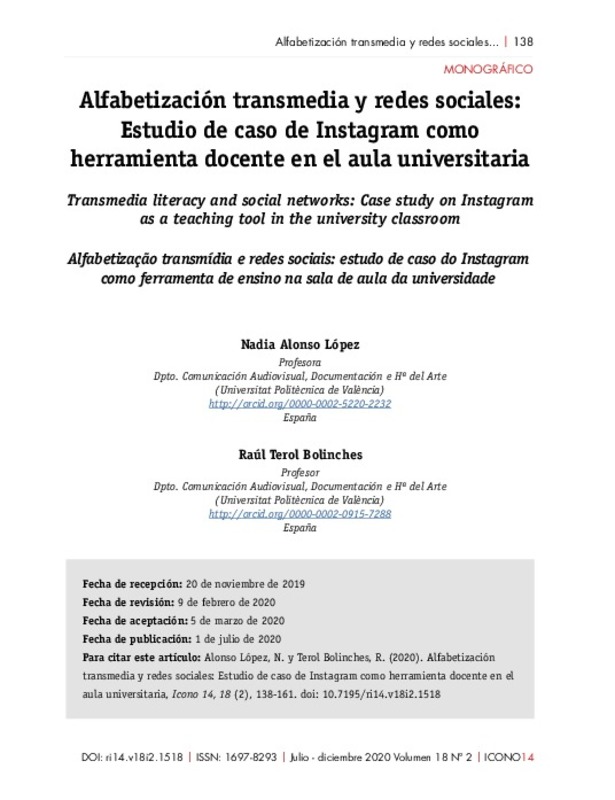JavaScript is disabled for your browser. Some features of this site may not work without it.
Buscar en RiuNet
Listar
Mi cuenta
Estadísticas
Ayuda RiuNet
Admin. UPV
Alfabetización transmedia y redes sociales: Instagram como herramienta docente en el aula universitaria
Mostrar el registro sencillo del ítem
Ficheros en el ítem
| dc.contributor.author | Alonso-López, Nàdia
|
es_ES |
| dc.contributor.author | TEROL-BOLINCHES, RAÚL
|
es_ES |
| dc.date.accessioned | 2021-07-01T03:32:50Z | |
| dc.date.available | 2021-07-01T03:32:50Z | |
| dc.date.issued | 2020-07-01 | es_ES |
| dc.identifier.issn | 1697-8293 | es_ES |
| dc.identifier.uri | http://hdl.handle.net/10251/168613 | |
| dc.description.abstract | [ES] En el actual entorno mediático los avances tecnológicos han dado lugar a nuevas formas de comunicación basadas en Internet, los dispositivos inteligentes y las redes sociales. En este contexto, las universidades reciben estudiantes pertenecientes a la llamada Generación Z, jóvenes que no conocen un mundo sin Internet, a los que su teléfono inteligente acompaña constantemente y que emplean las redes sociales como principal herramienta de comunicación, fundamentalmente Instagram. Teniendo en cuenta que la vida de esta generación está basada en estas prácticas relacionadas con la tecnología y el desarrollo de competencias transmedia (Scolari, 2018), éstas pueden ser aprovechadas en el aula universitaria para facilitar la docencia integrándolas en los procesos de enseñanza-aprendizaje. En la presente investigación, ponemos en práctica la implementación de las competencias transmedia de los jóvenes en la enseñanza universitaria con la creación de un canal de Instagram asociado a una asignatura del Grado en Comunicación Audiovisual de la Universitat Politécnica de Valencia- Campus Gandia, partiendo de los buenos resultados obtenidos en una experiencia piloto el curso anterior. El objetivo es mejorar la comunicación entre alumnado y profesorado, aumentar y mejorar la atención en la asignatura fuera del tiempo de docencia en el aula y, paralelamente, mostrar un uso responsable del móvil y las redes sociales, que pueden tener una utilidad docente. Para ello, empleamos una metodología cuantitativa y cualitativa, basada en formularios y valoración de resultados, así como en la revisión de otros proyectos de uso de redes sociales en el ámbito universitario y bibliografía al respecto. | es_ES |
| dc.description.abstract | [EN] In the actual media environment, technological advances have resulted in new forms of communication based on the Internet, smart devices, and social networks. In this context, universities receive students belonging to the so-called generation Z, young people who do not know a world without the Internet, which their smartphone regularly accompanies and who use social networks as the primary communication tool, mainly Instagram. Since this generation is based on these practices related to technology and the development of transmedia skills (Scolari, 2018), they can be used in the university classroom to facilitate teaching by integrating them into the teaching-learning processes. This research aims to put into practice the implementation of the transmedia skills of young people in university education with the case of the creation in the 2019-20 course of an Instagram channel associated with a subject of the Degree in Audiovisual Communication taught at the Universitat Politecnica de Valencia- Gandia Campus, based on the good results obtained in a pilot experience the previous year. The objective is to improve communication between students and teachers. Also, to increase and enhance the attention in the subject outside the teaching time in the classroom and, in parallel, show responsible use of mobile and social networks, which can have a teaching utility. For this, we use a quantitative and qualitative methodology based on the forms and evaluation of the results as well as, in the review of other projects of social networks use in the university field and the bibliography regarding this. | es_ES |
| dc.language | Español | es_ES |
| dc.publisher | Asociacion Cientifica ICONO14 | es_ES |
| dc.relation.ispartof | ICONO-14: Revista científica de Comunicación Audiovisual y Nuevas Tecnologías | es_ES |
| dc.rights | Reconocimiento (by) | es_ES |
| dc.subject | Transmedia | es_ES |
| dc.subject | Social networks | es_ES |
| dc.subject | es_ES | |
| dc.subject | University teaching | es_ES |
| dc.subject | Generation Z | es_ES |
| dc.subject | Internet: Redes sociales | es_ES |
| dc.subject | Docencia universitaria | es_ES |
| dc.subject | Generación Z | es_ES |
| dc.subject.classification | COMUNICACION AUDIOVISUAL Y PUBLICIDAD | es_ES |
| dc.title | Alfabetización transmedia y redes sociales: Instagram como herramienta docente en el aula universitaria | es_ES |
| dc.title.alternative | Transmedia literacy and social networks: Case study on Instagram as a teaching tool in the university classroom | es_ES |
| dc.type | Artículo | es_ES |
| dc.identifier.doi | 10.7195/ri14.v18i2.1518 | es_ES |
| dc.rights.accessRights | Abierto | es_ES |
| dc.contributor.affiliation | Universitat Politècnica de València. Departamento de Comunicación Audiovisual, Documentación e Historia del Arte - Departament de Comunicació Audiovisual, Documentació i Història de l'Art | es_ES |
| dc.description.bibliographicCitation | Alonso-López, N.; Terol-Bolinches, R. (2020). Alfabetización transmedia y redes sociales: Instagram como herramienta docente en el aula universitaria. ICONO-14: Revista científica de Comunicación Audiovisual y Nuevas Tecnologías. 18(2):138-161. https://doi.org/10.7195/ri14.v18i2.1518 | es_ES |
| dc.description.accrualMethod | S | es_ES |
| dc.relation.publisherversion | https://doi.org/10.7195/ri14.v18i2.1518 | es_ES |
| dc.description.upvformatpinicio | 138 | es_ES |
| dc.description.upvformatpfin | 161 | es_ES |
| dc.type.version | info:eu-repo/semantics/publishedVersion | es_ES |
| dc.description.volume | 18 | es_ES |
| dc.description.issue | 2 | es_ES |
| dc.relation.pasarela | S\410365 | es_ES |








